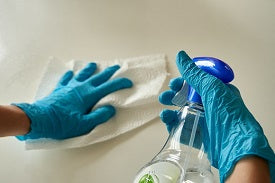
Oct 01 , 2020
How Long Does Covid 19 Live On Surfaces
From the onset of the Coronavirus pandemic, scientists have been fighting hard to learn more about the disease, to inform all activity relating to prevention and reduction in transmission. Scientists all round the globe are all working together, to pinpoint exactly how the virus is spread from one individual to another, and what measures we can take to protect our homes, businesses and communities against this massive threat to society.
A common query amongst many people lies around the potential risks inherent in contamination through touching surfaces, if infected individuals have been sharing communal space on public transport, and in business premises. While we have covered the critical nature of practicing sound hand hygiene through the use of soap, water and sanitiser, there is less available information concerning the risks involved with unsanitary.
Here’s what we know so far about Covid-19, and the risk of transmission through communal surfaces such as hand rails, car door handles and other areas which are frequently touched by a number of individuals.
Learning how Covid-19 can be transmitted through contaminated fomites.
A Fomite is any surface which has the capacity to be contaminated with infected organisms, and can then subsequently transmit these to a person.
To date, there have been two key pieces of research into the potential risks of contaminated fomites passing on Covid-19. The first is a study published in the New England Journal of Medicine, and the second was in the Lancet. Each applied Covid-19 organisms to surfaces, and assessed the rate of incubation and the length of time for which the virus remained viable.
Both research studies indicate that Covid-19 can remain viable on plastics on metal for between three days and up to a week. On paper and glass, the virus can live up to four days, and just four hours on copper. Cardboard can keep the virus viable for transmission for up to 24 hours, while wood can incubate it to stay viable for 24 hours. All of these results of the research into Covid-19’s viability on surfaces makes it clear why we need to conduct deep cleans of premises such as schools and retail outfits, to stop the virus from being transmitted from person to person.
For the virus to be transmitted from a surface to an individual, the person must first come into contact with the contamination through touch, and then go on to touch their mouth, eyes, nose or facial region. This then enables the virus to be transmitted, and begin to spread. There has been very clear guidance on the fact that people need to be aware of touching their face when in communal areas, directly as a result of this research.
Wearing a face mask is thought to inhibit inadvertently or unconsciously touching the face, and may help to prevent infection as a result. This is an additional benefit to wearing a mask, beyond simply preventing transmission through droplets or saliva, or airborne from coughing.
Keeping surfaces free of contamination
The best way to keep communal areas such as offices, public transport, schools, hospitals and other indoor spaces is to thoroughly deep clean all surfaces areas and objects which are frequently touched (such as door handles, for example). Our Anitviral Surface Disinfectant is proven to be effective against Coronavirus, killing it on contact. Keep aware of the potential for surface transmission of the virus, by maintaining frequent cleaning and sanitization of high-traffic areas. For more information view our range of products, here
